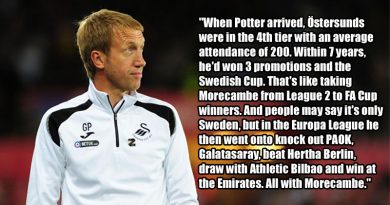Chris Hughton: A Brighton manager unfairly disparaged?
Brighton winning 2-1 against Bournemouth last Tuesday night was the Albion’s fourth win in a row. The first time they had achieved that feat since Chris Hughton was manager in the 2016-17 Championship promotion season.
I have always felt that Chris Hughton was unfairly treated during his time at the club, both in the way he was sacked and in the way he was criticised by many supporters during the later seasons of his tenure.
Prior to his sacking in those initial two Premier League seasons, with all the challenges that come with keeping a newly promoted team in the Premier League, he faced constant criticism and pressure from all around. Some of which came back to the club’s transfer policy, which he had little direct control over.
Furthermore, lest we forget the mess that he inherited when he joined. Hughton took over the worst Brighton team of the Amex era and possibly the worst under Tony Bloom’s period of ownership.
The Albion were nose diving from being on the brink of promotion to the Premier League to the brink of an unexpected return to League One.
So bad were the reputations of some of the first team options that fans would mockingly sing they would go on the pitch if certain players scored.
A chaotic period of recruitment in the two transfer windows prior to Hughton’s arrival meant the team he inherited was made up of misfits and second-rate players signed on loan as cheap options compared with making permanent additions.
Many of those who led the club to the League One title under Gus Poyet and three consecutive top half finishes in the Championship – including two playoff semi finals – had departed.
What Hughton did that was so underrated was make good players already at Brighton but maybe struggling under Sami Hyypia into key figures in the side which became only the second ever to win promotion for the Albion to the top flight.
Lewis Dunk and Dale Stephens in particular stand out as individuals who grew greatly under Hughton’s tutelage. They quickly became two of the most sought after players in the Championship.
Both would go onto be fundamental to Brighton’s promotion to and subsequent survival in the Premier League during Hughton’s tenure.
During his final season as Brighton manager, Sky Sports described Chris Hughton as: “One of the most respected managers in the Premier League.”
But if you looked on social media at the same time, you would have found many Brighton fans – as well as fans of clubs Hughton had previously managed – disagreeing.
Hughton moved into football coaching in the early 90’s, post-retirement from playing. Firstly at his old club Tottenham Hotspur.
In his time there, Hughton got a good idea of the unstable environment that is the life of a football manager. He worked under 11 different first team managers at White Hart Lane.
There are not many industries like football where an employee’s potential sacking is everybody’s business. Where your work is judged entirely on the basis of what other people do or don’t do.
A reality that leads to a key requirement of those working in the industry being significant levels of stoicism to deal with the stresses and strains of the job. Something Hughton had in bucketloads.
But one thing that was evidently clear throughout Hughton’s playing, coaching and management career is the importance he placed on easing the stresses and strains of those around him. Doing so with his calm and assured nature, enabling everyone to be at their best.
Tony Bloom and the Albion clearly recognised this quality. On giving him a four-year contract in response to missing out on automatic promotion on goal difference at the end of the 2015-16 season, the club said doing so it would “offer some stability.”
Something Hughton consistently offered throughout his time in charge of Brighton. His track record elsewhere attests to this quality, most notably at Newcastle United.
He led Newcastle to an immediate promotion back to the Premier League in 2009-10 following a chaotic relegation 12 months earlier.
That Hughton turned a Brighton side who were one of the worst teams in the Championship into one of the best in a period of months was hugely impressive.
Even more so was that after missing out on promotion so cruelly and dramatically on 2016, he then went one better in 2016-17.
The Albion could easily have suffered a hangover having come so close to reaching the top flight. Many clubs who almost touch the stars fall away the next season, some even as far as relegation.
Hughton leading Brighton to such an emphatic automatic promotion in immediate response to the heartbreak of the previous campaign was the clearest evidence the club were right in their belief he was the perfect man for the job – and exactly what it required at the time.
Of course, management is more than just creating a productive environment. Chris Hughton showed on many occasions during his time at Brighton that he is a likeable man, one that people want to be around and would work hard for.
This was never more so than when Anthony Knockaert’s father died. Hughton cancelled training and arranged for the whole squad to travel to France for the funeral.
It wasn’t just an empty gesture. It was a genuine show of support for a member of his team. An example of the culture that Hughton created and the team spirit and unity that he built. One which the club continues to thrive off to this day.
There are of course many ways in which football has changed since Hughton was a player. One example Hughton himself raised in the past is changing rooms being much more vocal in his playing days compared to now.
This is further evidence of his adaptability and personality. Being able to gain respect from a range of different personalities with his man management skills.
And it was the work that he did off the pitch with his players, that enabled him to get the best out of them on the pitch.
Hughton is a man who is admired and liked almost wholesale across the football industry. Neil Warnock was in charge of Cardiff City when the Bluebirds were a relegation rival for Brighton in the 2018-19 season.
Despite the intense battle to remain in the top flight, Warnock jokingly said of Hughton: “He’s bad for us as managers, he’s so nice! He gives us a bad reputation!”
And whilst Hughton is seemingly liked by all who have met him, it is fair to say he still showed his ruthless side whilst at the Albion.
As soon as he arrived, he was already judging the current talent and quickly axing long-serving, popular players.
Academy graduate and England youth international Jake Forster-Caskey was one of many deemed surplus to requirements.
Subsequently, Hughton refused to shirk from harder decisions. In the summer of 2017, he ruthlessly released the likes of Steve Sidwell and Liam Rosenior because of injury problems. This despite their status as fan favourites and pillars of the promotion winning side.
Now manager of French club Strasbourg, Rosenior spoke of Hughton’s ruthless streak on Sky Sports following his departure from the club.
Rosenior suggested Hughton was liked by so many because he treated others with respect rather than simply just being too nice.
The full back told how after releasing him, Hughton sat down with Rosenior for two hours to discuss his next options. This is not unusual for Hughton. To find an interview with a former colleague of where they don’t praise Hughton personally is a challenge.
And he tried to adapt too to changing circumstances too. You could tell that toward the end of his time in charge there was a realisation of what was still to be done with the Albion, despite the already impressive achievements.
Chris Hughton decided Brighton needed to become a more positive, attacking side to properly establish themselves in the Premier League. Instead of one who merely sought to defend their way to avoiding relegation ever season.
This seemed to play heavily on him – to the detriment of his decision making. Hughton switched from his tried and trusted 4-4-1-1 formation to 4-3-3.
The result was a team famed for its consistency and organisation seeming to lose direction. Brighton were victorious in the league only twice after the turn of the year, failing to win any of their final nine games of the season.
The second half of the 2018-19 campaign had actually begun with the Albion comfortably in mid table. There was even talk a record final position and the possibility of a top half finish.
But by the end, Brighton fumbled and stumbled their way to a narrow survival and the club’s lowest points total since promotion.
In no small part, only avoiding relegation thanks to the incompetence of their aforementioned relegation rivals Cardiff. Huddersfield Town and Fulham were somehow even worse.
However, the way that 2018-19 season ended should have no bearing on Hughton’s great achievements at the club over the preceding four years.
Throughout the two campaigns Hughton managed Brighton in the Premier League, he often spoke glowingly of the work done by managers of other smaller, less fashionable clubs.
Particularly referencing Sean Dyche at Burnley and Eddie Howe at Bournemouth as inspirations for what he could achieve at Brighton.
Both those clubs went onto be relegated after Hughton left the Albion. Brighton meanwhile remain in the top division.
That the Seagulls have gone onto better the achievements of Dyce, Howe, Burnley and Bournemouth – once considered the model – is testament to the foundations laid whilst Hughton was in charge.
In many people’s eyes, the pragmatism of Chris Hughton at Brighton was his undoing. Something that can too easily be written off as an overly defensive approach. But it was exactly this quality that was so key to his success whilst in charge.
Looking back six years later, it is easy to disparage Hughton. The longer the Albion have spent in the Premier League, the greater expectations become. Not to mention fans becoming more accustomed to success delivered by a certain style of football.
The reality of Brighton in 2025, however, was not the reality in 2014 when Chris Hughton first took over. The club was nearer to its Withdean tenure then than it is now to that first Premier League season.
History shows that staying up in the top flight and rising up the table tends to get easier the longer you spend in it. In some ways, this means it is no surprise the Albion continue to progress and set club records.
In those opening two Premier League campaigns, the resources available to Hughton were nothing compared to now. There was not an array of South American wonder kids and certainly no £200 million transfer budget.
Brighton and Hove Albion have moved onto bigger and better things since Chris Hughton. But those four-and-a-half years he spent in charge will forever be remembered as some of the greatest in the club’s history.
Furthermore, when we remember where the club was when he arrived, there are few – if any managers – in Brighton history who have changed its fortunes so much for the better.
Phil




